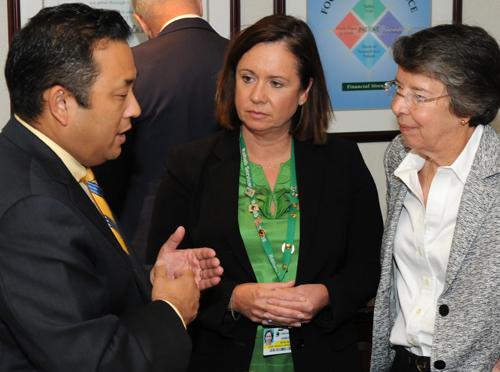White House visits Christiana Care substance abuse intervention program


Christiana Care hosted White House Deputy Director of the Office of National Drug Control Policy David K. Mineta, MSW, and colleague June Sivilli on Tuesday, Sept. 20, to take a closer look at the Christiana Care Department of Medicine’s successful substance abuse intervention program, Project Engage.
Led by Department of Medicine’s Terry Horton, M.D., chief, of Addiction Medicine and faculty in General Internal Medicine, Project Engage is a screening, brief intervention and referral to treatment program that has generated compelling results. Secretary of Delaware Health and Social Services Rita Landgraf and Delaware State Representative Michael Barbieri also attended, underscoring the key role Delaware plays as an incubator for innovative new programs, blending private and public interests. The program is a collaborative effort with Brandywine Counseling, Inc. and Delaware Physicians Care.
The program’s preliminary success and unique intervention model caught the White House’s attention.
Between Sept. 1, 2008, and Dec. 30, 2010, 423 patients consented to speak with the Project Engage interventionist. Of those 423 patients, 41 percent were successfully admitted to community-based substance use disorder treatment programs, directly leading to utilization reductions and cost savings in emergency department visits and hospital inpatient admissions.
Delaware Physicians Care, an Aetna Medicaid plan, has substantiated these results. In tracking patients who received peer-to-peer counseling, the group found that individuals were taking better care of their health, visiting their primary care physicians more and relying less on emergency care.
“What makes Project Engage so interesting,” said Mineta, “is there’s a research piece, a financing piece, a provider piece, and a [state] government piece. It’s unusual to see all these pieces in one place integrating substance use care with primary care.”
Project Engage identifies, refers and enrolls patients into community-based substance abuse disorder treatment, reducing subsequent hospitalizations and other costly health care services. The program, founded on a “low tech” approach, includes peer-to-peer counseling. An on-site embedded outreach coordinator from Brandywine Counseling works directly and intensely with patients who have been identified as being addicted to drugs or alcohol after they arrive at Wilmington Hospital. Key to the success of the program is engaging patients during such “reachable moments” and identifying barriers to intervention efforts.
Mineta noted another important byproduct of programs such as Project Engage: jobs creation. “We continue working on a workforce development timeline,” he indicated. “This meeting today is going to be a big start on the planning process. What you are doing ties to meaningful use and essential health benefits and electronic health records. It represents possibilities in the workforce as well,” he said, indicating that best practice programs such as this can “pave the way” for new job categories such as peer-to-peer counselors that have not historically been areas of focus.
“A collaborative approach is required to bend the cost curve and be more effective locally,” said Mineta. “Where we can find these types of collaborations … Christiana and Brandywine Counseling and Penn’s Researchers and the State and [a payor like] Delaware Physicians Care all collaborating, it draws attention like bears to honey.”
Photo gallery: White House visits Christiana Care Project Engage
Error fetching Flickr photos: A feed could not be found at `https://api.flickr.com/services/feeds/photoset.gne?lang=en-us&format=feed-rss_200&nsid=28142983@N07&set=72157627735830760&per_page=50`; the status code is `404` and content-type is `text/html; charset=UTF-8`